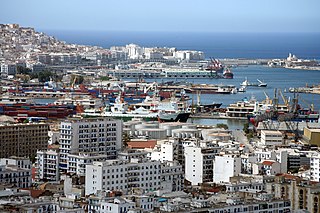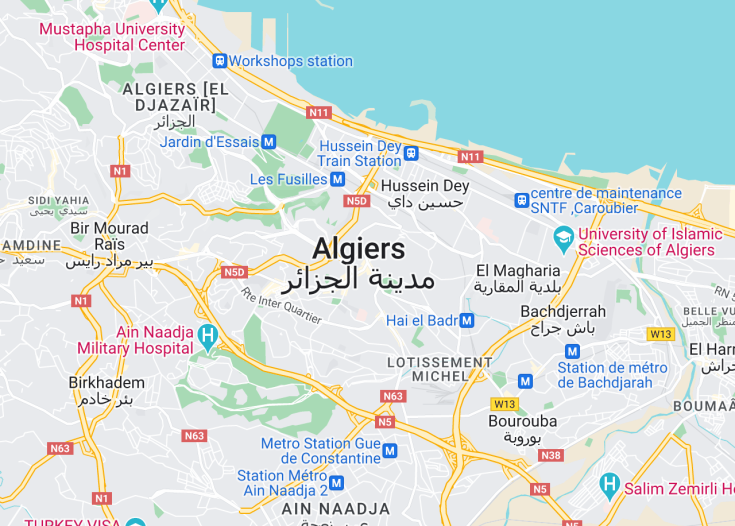Nestled along the Mediterranean coast, Algiers, the capital city of Algeria, presents a fascinating blend of historical epochs and cultural richness. Known as the ‘White City’ for its dazzling white buildings that gleam under the sun, Algers’ architecture is a testament to its storied past ranging from Ottoman influences to French colonial legacies. Its bustling streets, vibrant markets, and the historic Casbah, a UNESCO World Heritage site, offer an immersive experience into Algeria’s heart and soul. Algiers is not just a historical gem but a lively metropolis brimming with contemporary arts and culture.
When visiting Algiers, be sure to explore the Casbah. This historic area provides a labyrinth of narrow alleys and unique architecture, offering a glimpse into the city’s rich history.
For a deeper understanding of local culture, visit during the Festival of Algiers. It’s an excellent opportunity to experience traditional and contemporary Algerian music and arts firsthand.
Top things to do & see in Algiers
Select the following sights and activities to discover best tickets and tours available in Algiers.
Algiers: The White City
| Country | Algeria |
| Time in Algiers | GMT+1 |
| Language spoken | Arabic |
| Population | 3,415,811 (2022 estimates by the National Office of Statistics) |
| Currency | Algerian Dinar (DZD) |
| Airports |
|
Algiers, the vibrant capital of Algeria, exhibits a rich tapestry of history, culture, and modernity. Situated on the Mediterranean coast, it is known as “Algiers the White,” referring to its shimmering white buildings that overlook the sea. From its roots as a small port city established by the Phoenicians, Algiers has evolved into a significant political, economic, and cultural nexus in North Africa. The city’s architecture is a charming mosaic of French colonial buildings, Ottoman palaces, Islamic art, and modern structures which tell a story of a city that has long served as a crossroad of civilizations. A walk through the Casbah, a UNESCO World Heritage site, offers a glimpse into the city’s historical layers, bustling with narrow alleyways and bustling markets. Algiers serves also as a canvas for contemporary culture and politics. As the capital, it is home to the Algerian government and numerous foreign embassies, playing a pivotal role in both domestic policies and international diplomacy. The city’s educational institutions, such as the University of Algiers, attract students from across Africa and the Middle East, fostering a vibrant academic community. Aside from its historical and political significance, Algiers captivates visitors with its Mediterranean charm. The city’s coastline offers stunning views and serves as a gateway to exploring the lush, green landscapes of the surrounding areas. Algiers’s culinary offerings are a treat for food lovers, with local dishes that blend Berber, Arab, and French flavors. As Algiers continues to develop, it maintains its heritage while looking towards the future, making it not only a historical gem but also a dynamic city that is continuously evolving.</ not only a historical gem but also a dynamic city that is continuously evolving.
Where is Algiers?
Algiers is located along the Mediterranean coastline of north-central Algeria, North Africa.
Distances:
| Route | Distance by car | Time by car |
|---|---|---|
| Oran to Algiers | 259 mi | 4 hours 30 min |
| Constantine to Algiers | 265 mi | 5 hours |
| Tizi Ouzou to Algiers | 67 mi | 2 hours |
What is Algiers famous for?
Algiers is famous for its unique blend of architectural styles, including French colonial, Moorish, and modern designs, and its historical Casbah, a UNESCO World Heritage site known for its maze-like streets.
History
Antiquity to Middle Ages (10th century BC – 10th century AD)
Algiers, currently the capital of Algeria, was originally settled over a thousand years ago. Its strategic coastal location along the Mediterranean had already made it a significant hub for trade and cultural interchange among Phoenicians and later Roman civilizations in ancient times. The region, known by its ancient name Icosium, was a bustling market place and a minor port during the Roman era. Amid the ruins, the remnants of this period can still be distinctly observed.
Ottoman Rule (1516 – 1830)
In 1516, the region came under the control of the Ottoman Empire when the famous corsair brothers Aruj and Hizir Barbarossa seized the city. Under their leadership, Algiers became a center for maritime piracy which significantly impacted European trade in the Mediterranean. The city-state, known as the Regency of Algiers, flourished under the Ottomans, serving as a major base of operations against various European powers.
French Colonial Era (1830 – 1962)
The French invaded Algiers in 1830, marking the beginning of 132 years of French rule. This period was characterized by significant infrastructure development, where French architectural styles blended with the local environment, reshaping Algiers’ urban landscape. Despite economic growth, the era was also marked by social unrest and the struggle for independence, which was fervently fought by the Algerians.
Post-Independence Era (1962 – Present)
Algeria gained independence in 1962 after a prolonged and brutal conflict with France. Algiers has since evolved into a symbol of freedom and rebirth, while striving to maintain its cultural heritage and historical significance. The city today is a vibrant metropolis, combining a rich history with modern advancements. Key sites and museums testify to its complex and diverse past, reflecting a myriad of influences from various epochs.
Visit Algiers
What to see and do in Algiers
Algiers offers a rich tapestry of experiences, from historical explorations to lively cultural festivities. Notable attractions include:
- The Kasbah of Algiers: A UNESCO World Heritage site, offering insights into the city’s Ottoman past.
- Martyrs’ Memorial: This iconic monument offers panoramic views of the city and honors those who died during the Algerian War of Independence.
- Bardo National Museum of Prehistory and Ethnography: This museum holds artifacts that display Algeria’s prehistoric and cultural heritage.
- The Notre-Dame d’Afrique Basilica: A stunning basilica that combines Roman and Byzantine styles, overlooking the bay of Algiers.
- Central Post Office: An architectural marvel with its fusion of Moorish and Neo-Byzantine architecture.
Annual Events in Algiers
Algiers hosts several events throughout the year that celebrate its rich culture and history:
- The Algiers International Film Festival (October): A showcase of national and international films.
- Independence Day Celebrations (July 5th): Commemorates Algeria’s independence from French rule with parades and public festivities.
- Raï Music Festival (Summer): Celebrates the popular music genre that originated in Algeria.
Best time to visit Algiers
The best time to visit Algiers is during the spring (March to May) or fall (September to November) when the weather is mild, and the city is less crowded. These periods offer the ideal climate for exploring the rich historical sites and outdoor markets comfortably.
Is Algiers worth visiting?
Algiers presents a unique blend of historical antiquity and modern vibrancy. Its compelling historical sites, coupled with the bustling streets and Mediterranean charm, make it a significant travel destination. However, visitors should be prepared for some challenges such as navigating through traffic or occasional political unrest. Overall, for those interested in history, culture, and architecture, Algiers offers a multifaceted experience that is indeed worth exploring.









